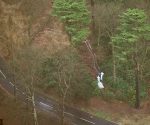Somewhat on the quiet, the Salih Khater trial starts at the Old Bailey
After the victimised “Tommy Robinson” character was sentenced to nine months imprisonment, and possibly a tuna diet – or whatever other abuse is to come at the hands of the Establishment (that will nevertheless no doubt mobilise a lot of fund raising), next up at the Old Bailey was Salih Khater. While the old trial was a veritable jamboree, the new one has been treated by the corporate-media as if it was a lepers’ colony. The reader might not be aware, but it appears that there have been two days thus far (8th and 11th July – at least that’s the impression given by the corporate-media) of this eagerly anticipated trial. The trial is ongoing, and while the usual consideration must be given, it will be useful for future treatment to make notes about the media coverage, and about the proceedings themselves.
Salih Khater was charged with attempted murder (two counts) and (alternatively) attempted grievous bodily harm (two counts) of civilians and police officers [not that there is strictly any difference: police are not military]. To treat, factually, the incident from which these charges arose: on 14th August, 2018, early on a London morning, a car left a set of traffic lights and down a stretch of road in a junction complex at the south-east corner of Parliament Square. The driver of the car then put the vehicle across a central reservation on to another exit from the junction, and in doing so collided with a pedestrian and a number of cyclists. The car then veered off into a road that would provide access to the St Stephen’s end of Parliament but for the barricade across it to prevent progress into the compound. The car crashed into this barricade at 32 miles per hour.
The single way that an audience of corporate-media’s reporting of the trial (to this point) can understand who was driving the car is to infer that it was Khater by the way he answered certain questions put to him. Indeed, this statement can be qualified further: as far as the author has been able to discover, it is only coverage of the 11th July proceedings, by the Coventry Telegraph (“CoventryLive”) and the Evening Standard (both carrying what is largely the same piece, with the former’s version being modified to reflect the significance of the defendant’s regional “origin”) that includes Khater’s responses to examination. [On the other hand, coverage that the author has found by Sky News, the Independent, the BBC and the Guardian is all limited to what must be the opening day, and report proceedings as though a monologue by the prosecution].
The CoventryLive reports
Giving evidence at the Old Bailey, Khater denied intending to kill anyone…
Asked to explain his driving, he said: “I was just lost. I was just lost in London.”
Replaying CCTV of the alleged attack, defence lawyer Peter Carter QC said: “Were you waiting for an opportunity to drive your car at cyclists?”
Khater said he was in a state of “confusion and hesitation”, trying to find his way to Tottenham Court Road or shops to get something to eat, not having had a meal since the morning before.
On the reason for the collision, he said: “I remember something made me panic.”
Asked why he failed to stop after crashing into a pedestrian and cyclists, Khater said: “The car was not in my full control at the time.”
Mr Carter said: “The prosecution say that you deliberately drove your car at those police officers.”
Khater replied: “I would say I have tried to find somewhere to stop after the incident at the traffic light.
“I collided with the barrier where two police officers were standing.”
It came to light that on 24th May, 2018, Khater had emailed Labour Party leader, Jeremy Corbyn – though how this was accomplished is not described in the featured reporting. Moreover, to varying degrees, the four above-named national corporate-media outlets largely glossed over this information, and instead addressed it abstractly from the prosecutions’ perspective.
The Telegraph, on the other hand, published at least some of what it called a “cryptic email” (and whether this constitutes the message in its entirety is not known by the author):
Dear leader, recently I have been subject to many event, which made really confused and very worried about who to talk to.
As I have start to break my silence I was to start by saying now I think they are the intelligence service, and I will be going to the police station to make an official complaint on Monday.
Khater’s communication was replied to by a Labour official telling him “we are sorry to hear about your personal issue”, and advising him to contact his local MP; the prosecution called this response “understandably vague”, and drew attention to the fact there was no record of a police complaint.
Please note that the CoventryLive article appears to state that the email contained the phrase “number of event”, but otherwise confirms the email’s content:
The email stated he was “confused and very worried”, claiming the event involved the “intelligence service”…
Asked to explain why he emailed Mr Corbyn, Khater said: “I was constantly stalked. It’s like I have been followed.
“That’s why I came to the conclusion that I should contact someone who should help.”
By August, Khater said he “might have still had those concerns”.
The prosecution characterised Khater’s experience as his demonstrating “signs of paranoia”. This is interesting language. “Paranoia” has a well defined modern meaning: to have an unjustified sense of being threatened. The word has presumably been used to depict Khater’s “concerns” as being unwarranted. However, the usage is problematic. There is no getting away from the fact that the word “paranoia” implies delusion, unless the usage has been careless, from a place of ignorance, or for purposes of mischief and deliberate misrepresentation – all things that cannot be countenanced in a court of law. “Signs of paranoia” is a phrase that must precisely mean “symptoms of mental disorder” – a matter, we might expect, to be established, or not, by expert witness?
We note that in several places in corporate media, Khater is called an “alleged terrorist”. He is not any such thing – the charges are quite clear. However, if corporate-media feels that it has been given a green-light from the trial to engage in such licence, then surely the source was a statement from the prosecuting QC, Alison Morgan – presumably part of her opening remarks to the jury:
Precisely why he wanted to kill people who he did not know is not clear. But you may think that by targeting Parliament Square, by targeting people that he did not know, and ultimately by attacking police officers guarding the Palace of Westminster, the defendant had a terrorist motive.
That is to say that he intended to use serious violence to pursue a religious, political or ideological cause. The prosecution allege that this is the obvious inference from what he did, where he did it and how he did it. But in fact the charges that you have to consider do not require you to determine that issue.
The fact of it does not feature in the corporate-media reporting, but the author can only assume that the jury would have been instructed to disregard all of the above bar the first sentence – which is pertinent, not least because it suggests that the Crown Prosecution Service have not been able to establish the defendant’s motive to commit an act of murder or grievous bodily harm.


















